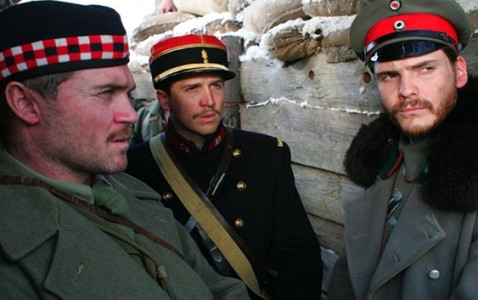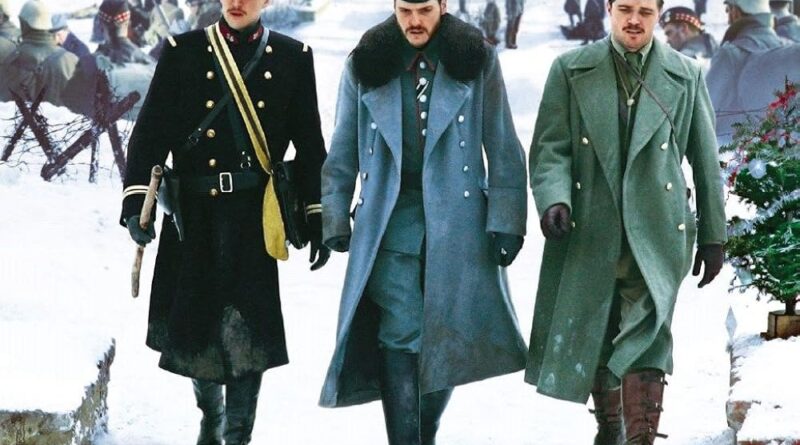Joyeux Noël (Merry Christmas) – The Heartwarming War Movie You’ve Never Seen
“The War to End All Wars” began in August, 1914. After a short stint of mobile warfare, and German forces pushing into Belgium and France, the defenders were able to stop them dead in their tracks. The exhausted armies dug defensive trenches, and so began the long war of attrition known as the defining feature of World War I’s Western Front.
On December 24th, it all seemed to stop. Unofficial ceasefires and truces took place along the Western Front, seeing soldiers from both sides sharing food, drink, and song.
While many artists have portrayed the Christmas Truce throughout the decades, Christian Carion’s Joyeux Noël (‘Merry Christmas,’ 2005) has stood the test of time as a dramatic but beautiful depiction of the actual events.
The Plot

Joyeux Noël begins with poems recited by schoolboys of each of the respective countries represented in the rest of the film: France, Great Britain and Germany. These were the big military powers of the war’s Western Front.
The British boy encapsulates the ideas of all the poems,
“To rid the map of every trace
Of Germany and of the Hun
We must exterminate that race
We must not leave a single one.”
The film follows an ensemble cast, but for this review, there are a few important main characters.
Gordon (Alex Ferns), a Scottish lieutenant; Audebert (Guillaume Canet), a French lieutenant; Horstmayer (Daniel Brühl), a German lieutenant; Nikolaus Sprink (Benno Fürmann), a German corporal and opera tenor; Anna Sørensen (Diane Kruger), Sprink’s Danish fiancée and opera soprano; and finally Father Palmer (Gary Lewis), a Scottish priest.
After a large battle which ends in a stalemate and the deaths of hundreds of men, the hell of trench warfare is a set reality. On the other hand, Christmas is on its way. To pass the time and spread cheer within the ranks, the Scottish troops sing songs like the movie’s original “I’m Dreaming of Home.”
Sprink and Sørensen, after they sing for the Crown Prince of Germany, decide to go to the front and sing for the troops on Christmas Eve. The singing becomes a spectacle, especially as Sprink climbs out of the trenches to sing in No-Man’s Land. Instead of being shot, he’s applauded, and the Scottish troops play bagpipes along to his singing “Adeste Fidelis” (“O Come All Ye Faithful”). When told to go back to the trench by Horstmayer, Gordon, and then Audebert leave their trenches and negotiate a ceasefire for the night.
The troops all leave the trenches and fraternize in what was once the deadliest place to be. Father Palmer delivers a sermon, and the soldiers exchange food, drinks, and conversation about loved ones.
The day after, the officers decide to extend the truce to bury the dead, which turns into another day of fraternizing and even playing soccer. This turns into even another day of truce, when both sides take shelter from artillery in each other’s trenches.
When all is said and done, the truce ends with punishment from commanders on all sides, as fraternization with the enemy is considered treason. Each unit is sent somewhere else, and mostly to sites where large and destructive battles would take place in the future.
Why is this important?

The film is a dramatization an amalgamation of many real stories that took place on Christmas, 1914. Real soldiers put down their weapons for at least a night to talk, give gifts and play games with their enemies.
Unofficial truces became common across the Western Front. However, this wasn’t always the case, as some attempts were met with hostilities before ceasefires could be made.
For example, Ernst Jünger writes in his memoir, Storm of Steel (1920), that Christmas didn’t turn out too well when he lost a man to a shot in the head.
When the British tried putting up a Christmas tree, Jünger and his comrades were “So embittered that they fired and knocked it over.”
In many cases, however, truces like the one in the film did occur. After only a few months of fighting, Christmas was one of the only things that brought some joy to the soldiers.
According to Silent Night (2001) by Stanley Weintraub, soldiers were given gifts by their governments for Christmas. Germans were given meerschaum pipes or cigars, and the British received “Princess Mary” boxes with chocolates and tobacco. The Germans especially were given Christmas trees like in the film to decorate.
Many outbreaks of soccer matches were reported, with a particularly well-known one between English and Saxon soldiers, where the Saxons won 3-2.
These stories are, by themselves, heartwarming, and some of the greatest Christmas stories ever told. In Joyeux Noël, the real stories are told for audiences around the world to understand.
The film is in three languages, English, German and French. There’s care taken in highlighting a lot of the differences but mostly the similarities in these men.
They all come from a similar geography, a lot of them have either been to or know people from the countries they’re fighting against. Lieutenant Horstmayer’s wife is revealed to be French.
In reality, a lot of this was also the case. There were many Germans who spoke English and helped bridge the language barrier because they had worked in England before.
In a way, the stories and the film spread the messages of embracing our commonalities and differences, and recognizing that the people we fight, whether on the battlefield or in our more comfortable daily lives, are still people.
The Christmas Truce didn’t end the first World War, and little acts of kindness and generosity won’t end hate in the world. Just like how officers and soldiers were punished by their superiors for the ceasefires, it can be difficult for people to spread even simple kindnesses due to their circumstances.
What we can take from the truce is the willingness to celebrate the Christmas spirit or spirit of giving with others, even if they’re different somehow. We’re all human, and our differences don’t define us, as characters in Joyeux Noël and the true stories made clear.
Even if you don’t celebrate Christmas, Joyeux Noël is a wonderful watch with great actors and scenes that stick for a while after you’re done watching. Through its characters, moments of dialogue and fun, and difficult-to-stomach ending, It’s a beautiful look at humanity itself.

